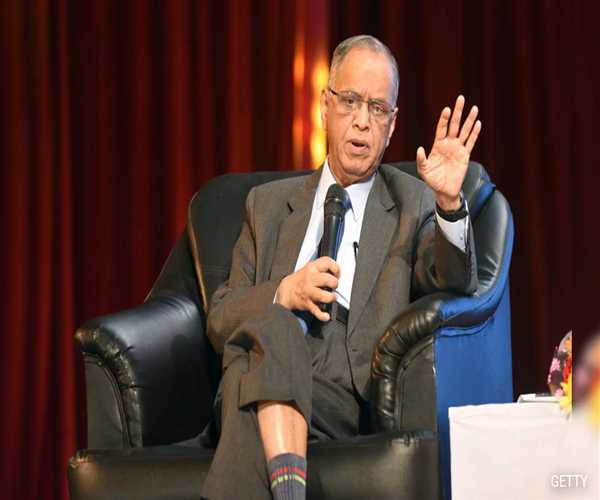
02-Nov-2023 , Updated on 11/3/2023 2:35:28 AM
See how Narayana Murthy tell youth to work for 70 hours a week
Employers take advantage of the intelligence and hard work of Indians, leading to an exploitation of their productivity. N. Murthy is worried about the rise in productivity and is responsible for explaining why employees at Infosys are facing the challenges of being underpaid and overworked. No employer can expect employees to overwork and be exploited further.
In order to ensure true productivity, it is important that everyone contributes rather than having a small group of individuals amassing enormous wealth while others do the majority of the work. N.Murthy has remained mum on his strategy for enhancing the overall productivity rather than just individual productivity. Is there any strategy in place to equally enhance productivity throughout Infosys? - Not yet. Those who advocate for N receive backing. Murthy and other CEOs cunningly reap financial gains at the expense of their hardworking employees.
Though Mr.Despite Murthy's status as a renowned personality, I respectfully disagree with the controversial statement made by them.
Mr.Murthy mistakenly believes that India follows the same 8-hour policy as the Western countries. I'm sorry, but we can only provide a specific arrival time for the office. However, the length of time we spend in the office is uncertain and typically exceeds 9 hours.
So, what you are questioning is why, despite our current efforts, the economy has not experienced significant growth over the years, Mr. Murthy?

If an employee spends 10 hours working, it takes them 2–3 hours to commute from the office. Does he have anything left in terms of his personal life? Is there any presence of a family? None. So, what is the purpose of our work? Who reaps the rewards of this economic system?
In Japan, Microsoft's experiment resulted in higher productivity when employees were given the opportunity to work fewer than 8 hours a day.
An Indian entrepreneur is suggesting that individuals dedicate 10 hours to work before navigating the unreliable public transportation system, leaving them with little opportunity to spend quality time with their families. This exemplifies the flaws in our corporate leadership, sticking to the outdated belief that more time spent equals increased productivity.
Corporate capitalists show little concern for the welfare of their employees. Currently, there is discussion regarding the recovery of the economy being shouldered by us. However, once the economy is lifted up, authorities may prioritize their own interests and employees may not even receive a substantial salary increase.
In fact, this comment was made as a proposal towards enhancing the Indian economy. On the contrary, the situation will be exacerbated instead.
Unemployment is a direct consequence of decreased job opportunities due to extended working hours. Furthermore, the abundance of job openings indicates an ample supply of skilled workers.
Both productivity and mental well-being will be significantly impacted. However, I believe he perceives the act of workers spending extended periods at their desks as being productive.
We cannot be equated to Japan as they have a higher amount of work hours due to a smaller workforce, unlike ourselves.
If his genuine concern lies with the economy, why not consider raising wages as a more effective measure? It would yield greater benefits. As our income increases, we tend to increase our spending - it's just basic economics!
Regardless, there is absolutely no reason to feel animosity towards him. Smart businessmen prioritize the optimal use of resources.
Ultimately, Mr. X Murthy, like any other capitalist, tirelessly works towards accumulating wealth.
Allow me to provide a straightforward illustration for this situation.
Working for 70 hours would not be productive for me. Many individuals currently dedicate 8 hours to their daily responsibilities, resulting in a workday of roughly 9 to 9.5 hours when factoring in lunch and snack breaks.
In order to fulfill a 70-hour work requirement, it would be necessary to allocate an additional 4 hours to work, resulting in a total of 12 hours of work. Moreover, one would need to include time for an additional meal and possibly a break, extending the workday to approximately 14 hours. It is worth noting that this calculation does not account for the time needed to commute to the office.
Working for extended periods of time is feasible occasionally but not on a daily basis. The health of employees would be negatively impacted by lengthy work hours, leading to decreased productivity in the latter part of the day.
Furthermore, according to Indian legislation, it is prohibited to require an employee to work for more than 48 hours per week. If an employee exceeds this set limit, they are legally entitled to receive overtime compensation, which is equal to double their daily wages. This implies that businesses will need to provide extra compensation for an additional 4 hours of work, resulting in almost twice the employee's regular salary. However, since productivity tends to decrease in the latter part of the day, this arrangement is unfavorable for companies, hence they are unlikely to agree to it.
Now, imagine a situation where you are assigned 60 hours of work without any additional compensation. In this case, you would not only be taking advantage of the employees, but it could also potentially be against the law (although I cannot provide legal advice). Therefore, companies are unlikely to engage in such practices.
The Indian government should enact a law that establishes a maximum limit of 40 working hours per week for employees in all organized sectors.
Additionally, we should contemplate the possibility of implementing a four-day work week.
Employees should be motivated to work for only three days a week while receiving a corresponding decrease in their salary.
It's important to motivate young people to utilize their extra time by engaging in creative activities, exploring new places, pursuing their passions, enhancing their knowledge and skills, and prioritizing quality time with their loved ones.
The goal of human existence is to find joy in the experience of life rather than being consumed by the relentless pursuit of wealth at the expense of living fully.
By reducing working hours, we can create more job opportunities for young people and effectively address the issue of unemployment.
Mr. Narayana Murthy's recommendation of working 70 hours a week is archaic, detrimental, and demonstrates a complete lack of respect for human values and dignity.
After reconsideration, it appears that Mr. Murthy might draw inspiration from our esteemed Prime Minister, who proudly asserts to tirelessly dedicate 18 hours per day, 7 days a week, and has not taken a break in an extensive period of time.
Modi ji proposed a workweek of 120 hours to help India become the leader of the world.
Mr Murthy displays a high level of compassion and thoughtfulness in comparison to others.
My suggestions are applicable exclusively to individuals who are mentally stable and not pertaining to divine, abnormal, or mentally ill human beings.
Let us strive to achieve a balanced life, prioritizing our well-being, instead of solely dedicating ourselves to work for long hours in order to increase the wealth of others. This way, we can safeguard our health, relationships, and joy, without sacrificing our happiness for the mere pursuit of additional income, and give ourselves the opportunity to savor the rewards of our hard work.

SEO and Content Writer
I am Drishan vig. I used to write blogs, articles, and stories in a way that entices the audience. I assure you that consistency, style, and tone must be met while writing the content. Working with the clients like bfc, varthana, ITC hotels, indusind, mumpa, mollydolly etc. has made me realized that writing content is not enough but doing seo is the first thing for it.
Comments
Join Our Newsletter
Subscribe to our newsletter to receive emails about new views posts, releases and updates.
Copyright 2010 - 2026 MindStick Software Pvt. Ltd. All Rights Reserved Privacy Policy | Terms & Conditions | Cookie Policy